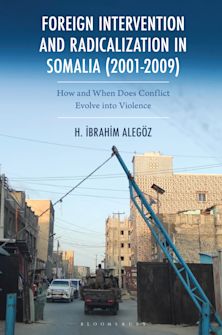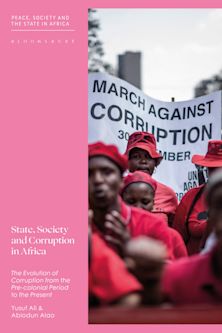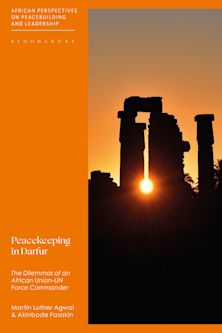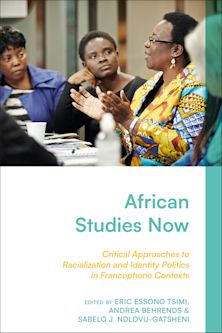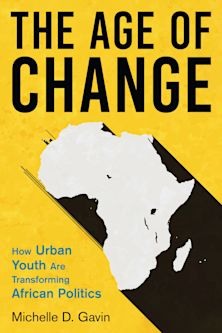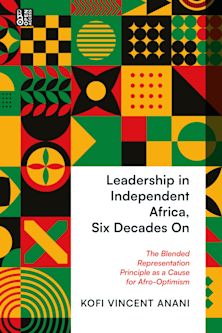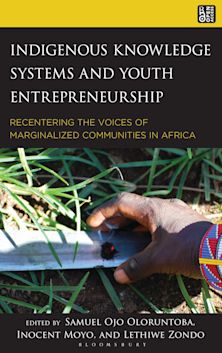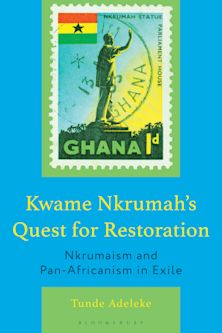- Home
- ACADEMIC
- Politics & International Relations
- African Politics
- Colonial Legacies in Francophone African Literature
Colonial Legacies in Francophone African Literature
The School and the Invention of the Bourgeoisie
Colonial Legacies in Francophone African Literature
The School and the Invention of the Bourgeoisie
You must sign in to add this item to your wishlist. Please sign in or create an account
Description
Colonial Legacies in Francophone African Literature: The School and the Invention of the Bourgeoisie by Mohamed Kamara examines the representation and lasting impact of the colonial school and bourgeoisie in Francophone sub-Saharan literature. Mohamed Kamara contends that the so-called indigenous colonial bourgeoisie was invented by the colonizer through the school to perpetuate the ideology of the colonizer, and he interrogates the policies and practices of the school and the ways they were informed by discourses of racial difference. While many works, like those authored by Gadjigo and Alessandri, have interrogated the impact of the colonial school on the African individual and society, they do not focus on the relationship between colonial education and the emergence of the African bourgeois and bourgeoise. Accordingly, this book analyzes the various literary strategies used in selected texts to paint a portrait of the school and the class it produced in view of showing the organic relationship between the two. This book adds a fresh perspective on the intimate connection between the school and social transformation in Francophone sub-Saharan Africa. Kamara suggests that the best solution for the continent resides in the continent’s ability to take what is good in its precolonial past and combine it with what makes sense in today’s reality.
Table of Contents
Introduction: Colonialism, Colonial Education, and the Invention of a Subaltern Class
Chapter 1: Pedagogy of the Colonized: Theories, Ideologies, and Policies of the Colonial School in Francophone Black Africa
Chapter 2: From Theory to Practice: The Colonial School in Francophone African Literature
Chapter 3: Making Good Wives and Good Mothers: The Education of Women in Colonial West Africa
Chapter 4: When Slaves, Bastards, and Dogs Rule: The Colonial School as Agent of Social Transformation
Chapter 5: The Colonial School and the Emergence of New African Types
Chapter 6: Reality or Invention? Literary Representation of the Bourgeoisie on Trial
Conclusion: A Literature of Failure
Bibliography
About the Author
Product details
| Published | 06 Dec 2023 |
|---|---|
| Format | Ebook (Epub & Mobi) |
| Edition | 1st |
| Extent | 266 |
| ISBN | 9781793644459 |
| Imprint | Lexington Books |
| Publisher | Bloomsbury Publishing |
About the contributors
Reviews
-
Mohamed Kamara unleashes an inventory of terms—assimilation, cultural erasure, formation, mission, training—on a library of African literary works in order to explore the symbiotic relationship between the colonial school and the emergence of a postcolonial bourgeois class. This culminates in a transcolonial analysis that sheds light on the impact of the French civilizing mission, a complex apparatus that provided the scaffolding upon which France’s empire was built. The historical legacies are relevant to contemporary debates on education and the imperative of decolonizing the curriculum, and underscore our collective responsibility when it comes to reassessing how institutions continue to shape mindsets, prevailing ideologies, and theories of race.
Dominic Thomas, University of California, Los Angeles
-
Kamara presents a sophisticated analysis of the longue durée structured by the intersection between colonial education and class formation regarding its impact on the postcolonial West African nation-state. This book shows how the persistence of the colonial education system maintains a debilitating comprador bourgeoisie in power throughout West Africa that militates against sovereign national development and true independence. It is a long overdue examination of a critical aspect of imperialist legacies in Africa.
James E. Genova, The Ohio State University
-
Making the case that colonial education was in many ways responsible for the underdevelopment of Africa, Kamara traces its history from the earliest ideologies of education through their implementation in colonial and postcolonial West Africa. This book traces the invention of the postcolonial bourgeois class and the specific attempts made to differentiate men’s and women’s education to mold colonial subjects intended to cater to different colonial needs. Meticulously reading the institution of the school in eighteen Francophone texts spanning over eight decades, this is a masterful work that ends with a passionate plea for school reform in Africa. A must read not only for literary scholars but also those invested in education in contemporary Africa in all its various forms.
Gaurav Desai, University of Michigan, Ann Arbor

ONLINE RESOURCES
Bloomsbury Collections
This book is available on Bloomsbury Collections where your library has access.












